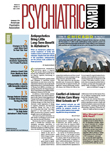Taking a buyout from an employer may be just as damaging to a worker's mental health as getting fired, said New York Times economics writer Louis Uchitelle at APA's 2008 annual meeting in Washington, D.C., in May.
Layoffs were traditionally considered part of life for blue-collar Americans and hence not so important to the middle and upper classes, said Uchitelle. “But once it got to white-collar workers, it suddenly seemed important,” he said.
Job loss acts as a social stressor that may diminish self-worth and lead to syndromes such as depression or anxiety. One recently published study found, for example, that the number of men presented by police for involuntary psychiatric admissions increased during a downturn in the labor market in Florida between 1999 and 2003.
Other studies, conducted by William Gallo, Ph.D., and colleagues at the Yale School of Public Health and based on the federal Health and Retirement Survey, have concluded that involuntary job loss is correlated with increased physical and mental health problems among workers over age 50.
The differences between layoffs and buyouts are only superficial, said Uchitelle. Buyouts may appear voluntary, but there is often an implicit or explicit threat to let go employees who don't take a buyout offer.
In researching a book on the subject (The Disposable American, Knopf, 2006), Uchitelle found that people who took buyouts were hurt far more profoundly than they would admit at first during his interviews with them. No matter what the circumstances, being asked to leave a job left them—and their former coworkers—with a sense that they were not worthy of continued employment.
People who are laid off or take buyouts often blame themselves for their situation. When Uchitelle told the people he interviewed for his book that they were facing a societal problem and that others were going through the same experience, they would agree but then quickly go on again about their own perceived failings.
“People who professed not to be damaged were damaged,” said Uchitelle. “There's always some sense of diminishment.”
Uchitelle has seen the effects first-hand at the Times, where many of his fellow employees have taken buyouts, as have colleagues at many U.S. newspapers. He hopes he'll never have to do the same.
When he was hired by the Times in 1980, his editor told him he would spend the rest of his career there. He felt he was part of a communal organization whose combined expertise made the paper possible. That sense has been fractured by the buyouts in recent years, he said.
He cited other examples from his book research, like the airline mechanic who had earned an engineering degree by going to school at night. When the company outsourced its respected maintenance program, the man was not offered a job in the engineering department and took the offered buyout. But somehow, the plans he made for his new life, like rehabbing and selling houses, never seemed to work out. He took a job as a school janitor at two-thirds his previous salary. Six months later, his wife called Uchitelle to ask for help in getting her husband into therapy.
He also noted the case of a woman who took a buyout from a large bank in New York, yet held on to the fantasy that bank officials would soon call and invite her back to work. When they failed to call after the September 11 attacks, she was first crushed by the feeling of being unwanted, but eventually managed to face up to the reality of her situation and move on, he said.
The problem is wider than just those who take the buyouts, are the victims of downsizing, or just laid off, said Uchitelle. There is widespread underemployment throughout the American economy.
“We've set up a system across our society of defense mechanisms against acknowledgement of the problem,” he said. “Both Democrats and Republicans have the same response. They blame the victim and assume the job is obsolete. If a person gets further training and education and doesn't get a job—well, then everyone still assumes it's the worker's fault.”
In the past businesses had at least some sense of social obligation, he noted. During downturns or recessions, workers might be furloughed (a term rarely heard these days, he added) but they would be hired back once the economy picked up steam again. Today workers are on their own, and their bosses may be no better off.
“People really want to look the other way,” said Duane Hagen, M.D., who introduced Uchitelle at the session. “This should be a major public health issue but it's not.”
Hagen, a psychiatrist at St. John's Mercy Medical Center of St. Louis, collaborated with Barrie Greiff, M.D., and Nick Kates, M.B.B.S., on a book titled The Psychosocial Impact of Job Loss (APPI, 1990).
“Not much has changed in 20 years,” he told Psychiatric News.
When Uchitelle spoke to students in Dartmouth's M.B.A. program, he suggested that perhaps executives might take a cut in pay rather than letting workers go permanently. The idea was met with dead silence. These future captains of industry, it turned out, appeared to have as bleak a view of the future as any assembly-line worker. One told him that the only way to survive was to earn as much money as possible before they, too, were asked or told to leave.
“Our only solution is to push back as a society against layoffs,” he said. ▪
